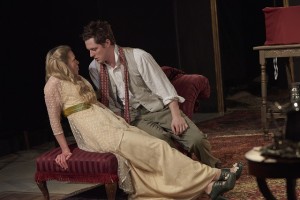liisa repo-martell & noah reid photo by michael cooper
Every once and awhile a production of a play comes along that leaves you so breathless and, ultimately, so entirely satisfied that words allude you, because everything you think to say falls short of capturing that perfect, ephemeral, living, breathing, reverberating theatrical experience. Sometimes the most important words are a simple “Go see it.” Creditors by August Strindberg now playing at The Coal Mine Theatre is one such production.
Strindberg considered Creditors (1889) his “most mature work,” although it is the much lesser-known Irish twin to the much-produced Miss Julie (1888), often considered Strindberg’s seminal play. Like Miss Julie, Creditors is a constructed as a triangle, although in this case we have two men, the young artist Adolph and the older teacher, Gustav, and the free spirited novelist Tekla who finds herself, like Julie, caught in a web fashioned of societal constructs that attempt to drain the life from her cheeks and the freedom from her heart.
The play begins with Tekla’s husband, Adolph, emotionally exhausted by a a churning, insecure mind, physically lame and requiring crutches, grasping onto his new friend, older, wise, Gustav, in the desperate hope that he will replenish him and make him strong enough to return to his creativity and faith in his talent as an artist. Yet, from the onset Gustav begins to slyly do the very opposite for poor Adolph. Like Iago with Othello, Gustav plants an entire garden’s-worth of seeds of doubt in Adolph’s ear. Surely he cannot believe there is a future in painting. Surely he must not trust his wife, considering that their own relationship began as an affair she had while married to her first husband. Has he heard all the gossip everyone has been spreading about them? It’s clear to everyone that he is being played for a fool. In fact, it seems like Adolph is on death’s door and has been driven thus by a philandering wife. Gustav latches on to every worry that Adolph has ever even briefly considered and deftly turns molehills to mountains and then to monsters that seek to devour even the possibility of joy from him just in time to greet Tekla, returning from a week away from home.
It quickly becomes apparent that Creditors is a play centred on the concept of revenge, of having been hurt so thoroughly that one is completely consumed with the torture and annihilation of those who have betrayed him. To Adolph, Gustav first verbally attacks Tekla, and indeed all women, as being vicious, selfish, leeches, appropriating knowledge, power and influence from their husbands to intentionally leave them weak, carcasses of their former selves. He builds himself up into such a misogynistic frenzy that the audience can’t help but laugh, delightedly, at his absurdity. It is incredible to see a play from 1889 that has pushed anti-feminist rhetoric to such an extreme that it inherently makes a mockery of itself. Yet, while the audience guffaws and triumphs, Adolph finds it difficult not to be sucked in by the nagging doubts concerning his wife’s fidelity. He loves her too much. She is too beautiful, too charming, too alluring, to possibly love him the way she says she does. Once Adolph has been convinced of his need to exert his masculine dominance over a wife who must be conquered and tamed, the trap has been set
Noah Reid gives Adolph a beautiful agonized desperation as he oscillates between mistrusting his friend and mistrusting his wife, and every ounce of his self-confidence crumbles in on him. Subtlety, Reid is able to give the audience brief glances of why the relationship between Adolph and Tekla works so well, but also alludes to the challenges that preceded the entrance of Gustav. The way he deflates when she teases him and calls him “Little Brother” betray his repressed humiliation. Yet, there are also moments when he looks at her with such tender admiration that their happily ever after seems so tangible. Liisa Repo-Martell’s Tekla is sparkling and radiant with a bright, concealing laugh that attempts to push all but the fun, frivolous and pleasurable away. She is sensual and coy, confident and refreshing, but as much as she is trying to be playful and condescending with Adolph, his strange behaviour tears a strip off her, and Repo-Martell allows Tekla’s vulnerability to shine through like a wide, cascading sunbeam. She becomes much more guarded and careful when finally confronted with Gustav, her flirtatiousness calming down into kindness as she shrinks a bit under his paternal shadow. When, at last, Repo-Martell’s Tekla realizes the horror of her predicament, it is absolutely heartbreaking.
Hardee T. Lineham’s pummelling Gustav is relentless, stone faced and with intense ire-ridden eyes. His sense of pacing, of meticulously well cautioned-steps toward bursts of carefully considered bouts of passion and urgency, is a marvel in subtext. Then he turns on a dime when faced with Tekla and even the audience’s mind is spinning trying to figure out his endgame.
In the wonderfully intimate basement theatre of the Coal Mine, under the Magic Oven, the audience faces one another, literally poised on the edge of their seats, hardly daring to breathe as Rae Ellen Bodie’s production holds the house captive and still. It’s one of those rides that finds you jarring back into consciousness during the curtain call when you suddenly become aware of the fact that you’ve been sitting in a theatre the entire time and the balloon of illusion you were floating in has just popped.
You owe it to yourself to go.
Creditors plays at The Coal Mine Theatre(798 Danforth Avenue, Toronto) until May 17. For tickets visit brownpapertickets.com.






 World Theatre Day: My God Is It Ever The Time to Invest in Canadian Plays
World Theatre Day: My God Is It Ever The Time to Invest in Canadian Plays 